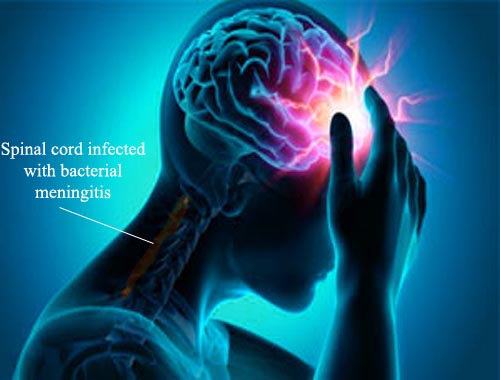Meningitis

Published: 18 Jun 2025
ICD9: 320.9 ICD10: G00.9 ICD11: 1D01.Y
Meningitis is an inflammation of the protective membranes covering the brain and spinal cord, known collectively as the meninges.
This inflammation is usually caused by an infection.
Here's a breakdown of key aspects of meningitis:
![]() Meninges: These are three layers of membranes that surround and protect the brain and spinal cord. They include the dura mater, arachnoid mater, and pia mater.
Meninges: These are three layers of membranes that surround and protect the brain and spinal cord. They include the dura mater, arachnoid mater, and pia mater.
![]() Causes:
Causes:![]()

![]() Bacterial: This is often the most serious type and can be life-threatening. Common bacteria include *Streptococcus pneumoniae*, *Neisseria meningitidis*, and *Haemophilus influenzae* type b (Hib).
Bacterial: This is often the most serious type and can be life-threatening. Common bacteria include *Streptococcus pneumoniae*, *Neisseria meningitidis*, and *Haemophilus influenzae* type b (Hib).![]()

![]() Viral: Often less severe than bacterial meningitis. Common viruses include enteroviruses, herpesviruses, and mumps virus.
Viral: Often less severe than bacterial meningitis. Common viruses include enteroviruses, herpesviruses, and mumps virus.![]()

![]() Fungal: Relatively rare, usually affecting people with weakened immune systems.
Fungal: Relatively rare, usually affecting people with weakened immune systems.![]()

![]() Parasitic: Rare and often associated with contaminated food or water.
Parasitic: Rare and often associated with contaminated food or water.![]()

![]() Non-infectious: Can be caused by chemical irritation, drug allergies, certain cancers, and inflammatory diseases.
Non-infectious: Can be caused by chemical irritation, drug allergies, certain cancers, and inflammatory diseases.
![]() Symptoms: Symptoms can vary depending on the cause and severity, but common signs include:
Symptoms: Symptoms can vary depending on the cause and severity, but common signs include:![]()

![]() Sudden high fever
Sudden high fever![]()

![]() Severe headache
Severe headache![]()

![]() Stiff neck
Stiff neck![]()

![]() Nausea or vomiting
Nausea or vomiting![]()

![]() Confusion or difficulty concentrating
Confusion or difficulty concentrating![]()

![]() Seizures
Seizures![]()

![]() Sensitivity to light (photophobia)
Sensitivity to light (photophobia)![]()

![]() Skin rash (sometimes, especially with bacterial meningitis)
Skin rash (sometimes, especially with bacterial meningitis)![]()

![]() Sleepiness or difficulty waking
Sleepiness or difficulty waking
![]() Transmission: Bacterial and viral meningitis can be contagious, spread through respiratory droplets (coughing, sneezing, kissing, sharing utensils). Fungal and parasitic meningitis are not typically contagious.
Transmission: Bacterial and viral meningitis can be contagious, spread through respiratory droplets (coughing, sneezing, kissing, sharing utensils). Fungal and parasitic meningitis are not typically contagious.
![]() Diagnosis: Diagnosis usually involves:
Diagnosis: Diagnosis usually involves:![]()

![]() Physical exam and evaluation of symptoms
Physical exam and evaluation of symptoms![]()

![]() Lumbar puncture (spinal tap) to collect cerebrospinal fluid (CSF) for analysis. This test checks for infection and identifies the type of organism causing the infection.
Lumbar puncture (spinal tap) to collect cerebrospinal fluid (CSF) for analysis. This test checks for infection and identifies the type of organism causing the infection.![]()

![]() Blood tests
Blood tests![]()

![]() Imaging (CT scan or MRI) of the brain
Imaging (CT scan or MRI) of the brain
![]() Treatment:
Treatment:![]()

![]() Bacterial meningitis: Requires immediate treatment with intravenous antibiotics.
Bacterial meningitis: Requires immediate treatment with intravenous antibiotics.![]()

![]() Viral meningitis: Treatment is often supportive (rest, fluids, pain relief) as most cases resolve on their own. Antiviral medications may be used in certain cases.
Viral meningitis: Treatment is often supportive (rest, fluids, pain relief) as most cases resolve on their own. Antiviral medications may be used in certain cases.![]()

![]() Fungal meningitis: Requires antifungal medications.
Fungal meningitis: Requires antifungal medications.![]()

![]() Other types: Treatment focuses on addressing the underlying cause.
Other types: Treatment focuses on addressing the underlying cause.
![]() Prevention:
Prevention:![]()

![]() Vaccination: Vaccines are available for some types of bacterial meningitis (e.g., meningococcal, pneumococcal, Hib).
Vaccination: Vaccines are available for some types of bacterial meningitis (e.g., meningococcal, pneumococcal, Hib).![]()

![]() Good hygiene: Frequent handwashing can help prevent the spread of infections.
Good hygiene: Frequent handwashing can help prevent the spread of infections.![]()

![]() Avoid close contact with sick individuals: Especially if they have meningitis symptoms.
Avoid close contact with sick individuals: Especially if they have meningitis symptoms.![]()

![]() Prophylactic antibiotics: Sometimes given to people who have been in close contact with someone with bacterial meningitis to prevent infection.
Prophylactic antibiotics: Sometimes given to people who have been in close contact with someone with bacterial meningitis to prevent infection.
![]() Complications: Meningitis can lead to serious complications, including:
Complications: Meningitis can lead to serious complications, including:![]()

![]() Brain damage
Brain damage![]()

![]() Hearing loss
Hearing loss![]()

![]() Learning disabilities
Learning disabilities![]()

![]() Seizures
Seizures![]()

![]() Kidney failure
Kidney failure![]()

![]() Death
Death
Important Note: Meningitis is a serious medical condition. If you suspect that you or someone you know has meningitis, seek immediate medical attention. Early diagnosis and treatment are crucial to prevent serious complications.
This information is for general knowledge and should not be considered medical advice. Always consult with a healthcare professional for diagnosis and treatment.